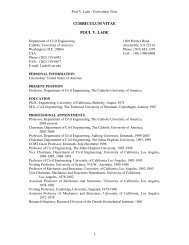Nota Bene-- C:\ARTICLES\TERMIN~1.NB Job 1 - the Catholic ...
Nota Bene-- C:\ARTICLES\TERMIN~1.NB Job 1 - the Catholic ...
Nota Bene-- C:\ARTICLES\TERMIN~1.NB Job 1 - the Catholic ...
Create successful ePaper yourself
Turn your PDF publications into a flip-book with our unique Google optimized e-Paper software.
failure to realize that Paul is not referring to Israel’s pursuit of <strong>the</strong> Law from faith in<br />
9:32a often misleads to <strong>the</strong> interpretation that in 10:4 Christ is <strong>the</strong> goal or fulfillment of<br />
<strong>the</strong> Law Israel was pursuing from works ra<strong>the</strong>r than from faith.<br />
There is a second and separate reason why Israel failed to attain <strong>the</strong><br />
righteousness <strong>the</strong>y pursued: “They stumbled over <strong>the</strong> stone of stumbling, as it is<br />
written, ‘Behold, I place in Zion a stone of stumbling and rock of offense, but <strong>the</strong> one<br />
who believes in him will not be put to shame’ (Isa 8:14; 28:16)” (9:32b-33). Since <strong>the</strong><br />
relation between 9:32a and 9:32b is a grammatical asyndeton, it is best not to posit any<br />
causal relationship ei<strong>the</strong>r way. 14 That Israel failed to attain <strong>the</strong> righteousness that is <strong>the</strong><br />
object of <strong>the</strong> Law (9:32a) is not necessarily <strong>the</strong> cause of nor is it necessarily caused by<br />
<strong>the</strong> fact that Israel stumbled over <strong>the</strong> stone of stumbling (9:32b). These are two<br />
different failures whose relationship Paul leaves open at this point by <strong>the</strong> asyndeton. 15<br />
That <strong>the</strong> stone and <strong>the</strong> failure to believe in it/him refers to Christ (ra<strong>the</strong>r than <strong>the</strong> Law) is<br />
confirmed by <strong>the</strong> repetition in 10:11 of “<strong>the</strong> one who believes in him will not be put to<br />
shame” in a context in which “in him” (ε� π� αυ� τω,^ ) can only refer to Christ. 16 Israel’s<br />
failure to believe in Christ, <strong>the</strong>n, is a separate failure and mystery in itself for Paul (cf.<br />
9:1-5).<br />
Romans 9:32b-33 epitomizes Paul’s rhetorical strategy in Rom 9-11. That Israel<br />
failed to believe in Christ accords with God’s word (cf. 9:6) in scripture (“as it is written,”<br />
9:33a) and is part of God’s plan (“I [God] place in Zion a stone of stumbling,” 9:33a); <strong>the</strong><br />
rhetorical thrust, however, lies in <strong>the</strong> final appeal contained in this scriptural quote,<br />
namely, “but (adversative ra<strong>the</strong>r than conjunctive και`) <strong>the</strong> one who believes in him will<br />
not be put to shame (by God, divine passive)” (9:33b). In o<strong>the</strong>r words, although <strong>the</strong><br />
way to attain righteousness by doing <strong>the</strong> works of <strong>the</strong> Law is a dead end, <strong>the</strong> way of<br />
attaining righteousness by faith in Christ, even though Israel at this point has stumbled<br />
over him, is still available to Israel as it is to anyone who believes. 17 This explicit appeal<br />
for Israel to believe (ο� πιστευ' ων) in Christ in 9:33 thus prepares for and develops into<br />
5
















